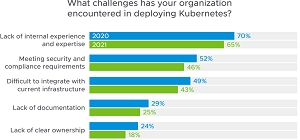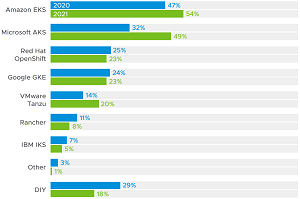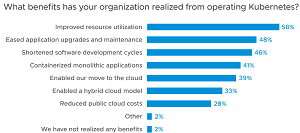News
VMware Study: Kubernetes Thrives, But Expertise Is Top Challenge
VMware's new Kubernetes study shows the fast-growing open source project continues to thrive, though a lack of expertise is a big challenge for enterprise adoption.
"The State of Kubernetes 2021" says, "Companies are quickly figuring out how to operationalize Kubernetes, some software companies are mainstreaming the technology, and everyone is seeing clear benefits as the Kubernetes ecosystem matures."
It also shows a decided shift from on-premises installations to multi-cloud implementations, whereas last year's report found that on-premises installations outnumbered public cloud deployments for the container orchestration system, described as "still very young" at the time.
"Given Kubernetes' multi-cloud benefits, perhaps it's not surprising that this year's survey shows a shift away from on-premises deployments," the 2021 report says. "On-premises was selected by just 55 percent of respondents this year, a decrease of 9 percent relative to 2020. Single and multi-cloud deployments each increased by 5 percent, with more than a third (36 percent) of respondents utilizing multiple public clouds and intentionally pursuing a multi-cloud strategy."
While the above data suggests that enterprise IT teams are getting more familiar with Kubernetes and more comfortable with cloud deployments, finding expertise remains a top challenge.
 [Click on image for larger view.] Top Challenges (source: VMware).
[Click on image for larger view.] Top Challenges (source: VMware).
In selecting a Kubernetes distribution, lack of internal experience and expertise is still the biggest challenge in making such decisions(reported by 55 percent of respondents), while hard to hire needed expertise is also a notable challenge (37 percent).
Lack of internal experience and expertise is also the top challenge in deploying Kubernetes.
With experienced talent hard to find in-house and to hire, it's not surprising that managed Kubernetes services are enjoying increased popularity.
 [Click on image for larger view.] Top Offerings (source: VMware).
[Click on image for larger view.] Top Offerings (source: VMware).
In the cloud, Amazon EKS on the AWS cloud platform is still the top dog (used by 54 percent of respondents this year, 47 percent last year), though the Microsoft Azure platform's offering, Microsoft AKS, is closing the gap (49 percent this year, 32 percent last year.) VMware's own Tanzu offering saw an increase in reported use from 14 percent last year to 20 percent this year.
Other highlights of the report include:
- An important sign of Kubernetes momentum is the continuing shift to production, growing from 59 percent in the 2020 report to 65 percent this year.
- Clear benefits for everyone: Almost everyone surveyed (98 percent) sees significant benefits from Kubernetes. The top benefit this year was improved resource utilization (selected by 58 percent). Second was eased application upgrades and maintenance (48 percent), edging out last year's number two choice, shortened software development cycles, which came in a close third this year at 46 percent.
 [Click on image for larger view.] Top Benefits (source: VMware).
[Click on image for larger view.] Top Benefits (source: VMware).
- Kubernetes' workload portability and automated scaling put it front and center as companies build out hybrid and multi-cloud strategies. Standalone on-premises deployments are transitioning to become part of hybrid and multi-cloud operations.
- Multiple stakeholders is the new normal: As companies accelerate digital transformation, more stakeholders are getting involved in decisions involving cloud native technologies like Kubernetes -- as well as day-to-day operations. While the days when technology decisions were largely the domain of IT are a thing of the past, teams appear to be adapting to having multiple cooks in the kitchen.
- Given that lack of expertise is the biggest challenge when choosing a Kubernetes distribution, perhaps it's not surprising that easy to deploy, operate and maintain is the most important factor in Kubernetes selection (61 percent), followed closely by product capabilities and roadmap (45 percent). In keeping with the shift toward multi-cloud, 41 percent selected works in a hybrid cloud as an important factor. Vendor maturity, access to services and support, and avoiding lock-in also ranked highly.
- Deployment and management challenges decreased across the board: Respondents experienced fewer Kubernetes deployment and management challenges than previously, with 4-6 percent reductions across the board on deployment challenges and up to 14 percent decreases on management challenges.
- Towards DevSecOps: Assuming teams gain expertise and ease of use continues to improve over time, security becomes the biggest concern for Kubernetes in the enterprise. Adopting DevSecOps practices to control security across the end-to-end container lifecycle is the key to enhancing security and gaining agility.
The survey, conducted by Dimension Research, focused on on individuals with responsibility for Kubernetes at companies with 1,000 or more employees, polling 357 qualified software development and IT professionals in a wide range of roles, industries, regions and job levels.
About the Author
David Ramel is an editor and writer at Converge 360.